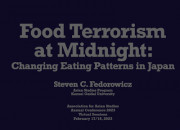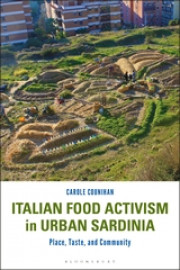From grasshoppers to grubs, an eye-opening look at insect cuisine around the world.
An estimated two billion people worldwide regularly consume insects, yet bugs are rarely eaten in the West. Why are some disgusted at the thought of eating insects while others find them delicious? Edible Insects: A Global History (Reaktion Books, 2021) provides a broad introduction to the role of insects as human food, from our prehistoric past to current food trends—and even recipes. On the menu are beetles, butterflies, grasshoppers, and grubs of many kinds, with stories that highlight traditional methods of insect collection, preparation, consumption, and preservation. But we not only encounter the culinary uses of creepy-crawlies across many cultures. We also learn of the potential of insects to alleviate global food shortages and natural resource overexploitation, as well as the role of world-class chefs in making insects palatable to consumers in the West. From grasshoppers to grubs, an eye-opening look at insect cuisine around the world.
An estimated two billion people worldwide regularly consume insects, yet bugs are rarely eaten in the West. Why are some disgusted at the thought of eating insects while others find them delicious? Edible Insects: A Global History provides a broad introduction to the role of insects as human food, from our prehistoric past to current food trends—and even recipes. On the menu are beetles, butterflies, grasshoppers, and grubs of many kinds, with stories that highlight traditional methods of insect collection, preparation, consumption, and preservation. But we not only encounter the culinary uses of creepy-crawlies across many cultures. We also learn of the potential of insects to alleviate global food shortages and natural resource overexploitation, as well as the role of world-class chefs in making insects palatable to consumers in the West.
Edible Insects is part of the Edible Series published by Reaktion Books. It is a revolutionary series of books on food and drink which explores the rich history of man’s consumption. Each book provides an outline for one type of food or drink, revealing its history and culture on a global scale. 50 striking illustrations, with approximately 25 in colour, accompany these engaging and accessible texts, and offer intriguing new insights into their subject. Key recipes as well as reference material accompany each title. Also available through The University of Chicago Press.
See our other episodes on Edible Series:
Avocado by Jeff Miller
Coffee by Jonathan Morris
Vanilla by Rosa Abreu-Runkel
Mustard by Demet Güzey
Saffron by Ramin Ganeshram
Tomato by Clarissa Hyman
More episodes from this series to come…
Dr. Gina Hunter is Associate Professor of Anthropology in the Department of Sociology and Anthropology at Illinois State University. She has published research on women’s reproductive health, foodways and food systems, the ethnography of the university, and pedagogy and research methods. At Illinois State, she is director of the Office of Student Research, co-Director of the Food Studies Minor, and is affiliated with the Latin American and Latino/a Studies Program. Her regional specialty is Brazil and has twice led a study abroad program in Brazil.
Amir Sayadabdi is Lecturer in Anthropology at Victoria University of Wellington. He is mainly interested in anthropology of food and its intersection with gender studies, migration studies, and studies of race, ethnicity, and nationalism.
Learn more about your ad choices. Visit megaphone.fm/adchoices
Support our show by becoming a premium member! https://newbooksnetwork.supportingcast.fm/anthropology
Visit New Books in Anthropology for the podcast. There is something wrong with this RSS-feed. Lorenz, antropologi.info


